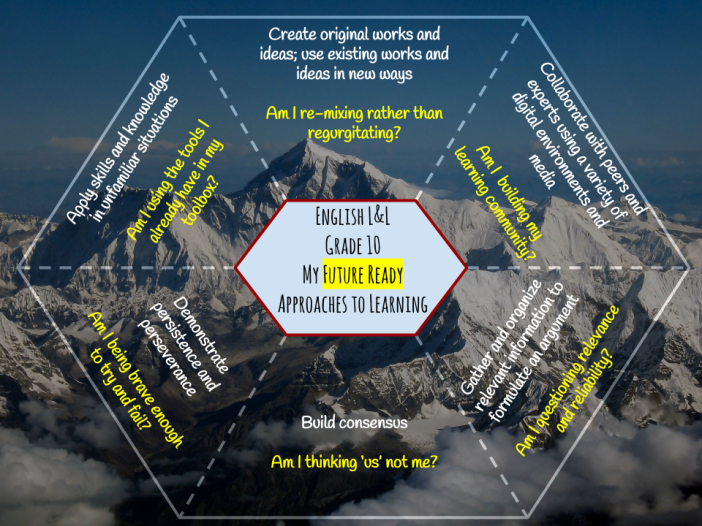What if we acted out our belief that learning should be lifelong and that skills and concepts outlast knowledge?
The Backstory
My school uses a number of curriculum frameworks – the Middle Years Programme, the Diploma Programme, Advanced Placements and our own homegrown curriculum. One way of unifying the potentially disparate approaches is to focus on key attributes of curriculum that transcend them all. Our departmental team picked three:
AUTHENTIC – ESSENTIAL – LEARNING TO LEARN

Authentic stresses the relentless need to provide freshness and relevance. Essential captures the importance of meeting the needs of our students, whether those are the inevitable ‘exam ready’ skills, or crucial ‘future ready‘ skills. Learning to learn functions as a foundational concept, highlighting the need to develop lifelong skills in our students.
It’s this last aspect that my team has been playing with recently, re-envisioning the International Baccalaureate’s (IB) Approaches to Learning (ATL) skills as a hexagon of future ready skills, accompanied by guiding questions, and designed for specific courses. Though you should certainly build learning experiences to develop more than six ATL skills in a year, when confronted with the question, ‘Which are the most important skills for a student in my class?’ the most authentic and essential aspects of the vision emerge:

But, what if we went further?
What if…
Every student identified, and reflected, on the six ATL skills they felt they needed to develop that year?
Every teacher identified, and shared with students, the six ATLs with which they were engaging?
Every teacher posts the six ATLs on their classroom door, with this note: ‘Dear colleagues, if you can spare the time, please come in and help me with my journey‘
These six skills became the focus of teacher reflection in their professional discussions, both digital and analogue?
Would we then be closer to acting out our belief that learning should be lifelong – that learning to learn is the most future ready skill of all?
At the very least, we might be just that little bit closer to curricular lift off.
 Thoughts?
Thoughts?
Hi Phil,
Great post–in particular I love the achievable, applicable goal: we could initiate this by the end of the month. The question is, will we? In light of your post I’ve also been thinking about the approach a few other schools have taken with PD: setting aside funds for development not explicitly linked to school. For example, NIST paid for me to take violin lessons (my Twinkle Twinkle Little Star was…well…that’s for another post). The reminder that we work on core skills in a variety of ways is powerful and important to remember. What if we included in that public sign a note about what we are doing outside of school to get better at ‘x’?
LikeLiked by 1 person
I’m on the fence as to whether I’d like you to continue learning the violin…
I think in terms of the ‘will we?’ question, it, as with so many different things in life, is a matter of just getting it done. What if I, you, both of us, John, anyone, placed a blank template in everyone’s pigeon holes, ready to complete and put up? Perhaps, taking that little barrier away might get the ball rolling.
After the long weekend, I will be putting up my own hexagon on my door. Maybe all it needs is a few people to give permission for others to follow?
LikeLike